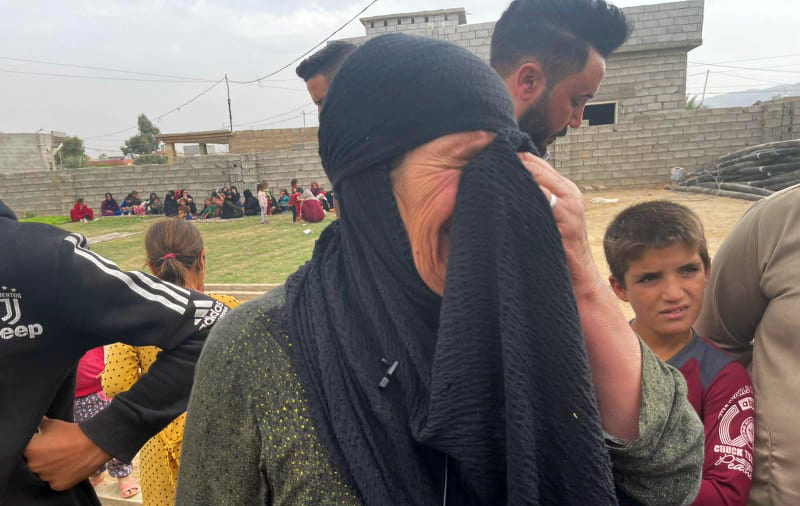The extremist militants of Islamic State in Iraq and Syria ISIS have managed to carry out three attacks in Kirkuk Northern Province on Wednesday at night yet they have failed to leave any casualties, a recession in the deadly attacks ISIS leading lately.
The three raids stormed three different locations north, west and south of Kirkuk where eight people were killed in two separate attacks end of October, escalating their moves and putting the security forces on alert.
About 10 pm, militants attacked a point where the pro-Iran Shiite paramilitary of Popular Mobilization Forces PMF in the village of al-Bushahab of Daquq district, 44 km south of Kirkuk yet no casualties reported, a security source told Kirkuk on the condition of anonymity.
"Clashes erupted for a while yet the militants withdrew and mortared the region but no deaths," he added.
Clashes erupted for a while yet the militants withdrew and mortared the region but no deaths
In a separate incident, the militants stormed brigade 20 of Iraqi federal police deployed in al-Rashad sub-district of predominantly-Sunni Arab Resident Hawija district west of Kirkuk.
The area was under control of IS from June 2014 up to 2017, one of the strongholds of IS where they had hideouts and a big tunnel, locals said, till it was bombed by the international coalition and Iraqi security forces took control.
A military commander of Kurdish Peshmerga anonymously told KirkukNow that "Daesh raided Birgade 10 of Peshmerga in Zirgaziraw and confronted for about 20 minutes and left."
It’s the second time in a week the militants target the same point of the Peshmerga. Saturday night around 9:30 pm Baghdad local time, Daesh militants by BKC rifles target the Peshmerga (Kurdish fighters) in the heights of Zurgazraw of Pirdy district.
Two personnel of the Peshmerga were killed, Nouri Hama Ali commander of the Kurdish troops west of Kirkuk, told the media.
ISIS militants have carried out seven attacks in the last seven days targeting civilians and military forces in which eight people killed, four of them civilians.
The figures about Daesh attacks by the ministry of Peshmerga MOP under the Iraqi Kurdistan Regional Government KRG show they have carried out 2412 attacks in the last four years since 2018.
Lieutenant general Jabar Yawar, secretary general of the MOP, told voice of America VOA Kurdish service on Thursday, "We have not agreed with Baghdad when it has declared end of Daesh in 2017 since it has led 2412 attacks up to last October. About 1742 attacks were carried out in 2018, 270 in 2019, 230 in 2020, 170 in 2021 up to end of October."
The Iraqi Prime Minister haider al-Abbadi has declared defeat and end of Daesh in Iraq in 2017 when Iraqi forces regained control over the war-ravaged Mosul, the stronghold of ISIS for three years.
"Most of the attacks by Daesh were in the disputed territories beyond control of the KRG in different tactics. Back, they were leading battle attacks while now small detachments attack Iraqi forces or the Peshmerga," Yawar elaborated.
"They also resort to suicide attacks, implanting IEDs, snipers attacking our forces from remote areas, ambushes on the streets or abduction of civilians for ransoms."
They know elections were held so they want to want to disturb the situation in order to influence formation of the new cabinet
Daesh have escalated its attacks following the general elections in Iraq on October 10th.
"They know elections were held so they want to want to disturb the situation in order to influence formation of the new cabinet but still they are not powerful as in the past and cant raid and take over territories or have an administration on the ground alike 2014."
Back in 2014, ISIS took over almost one third of Iraqi territories. End of 2017, the Iraqi government declared victory and defeat of IS yet a report by the United Nations UN published early this year estimated thousands of Daesh fighters remain active across Iraq and Syria.
Baghdad and Erbil have agreed to deploy two joint brigades in areas where the security vacuum is and Daesh is using as hideouts and lead fatal attacks.
"There is a real need to deploy four not two joint brigades in the disputed territories in order to limit Daesh maneuvers since it is a large area from Khanaqin to Kirkuk & from Makhmour to Ninewa plains," KRG deputy chief of staff General Qaraman Kamal told PUK media Monday.
Sleeper cells and resistant pockets of ISIS militants are regrouping in the rural areas of the disputed territories between Baghdad and Erbil. They are targeting Iraqi forces and civilians in the suburbs of Diyla, Kirkuk Ninawa, Salahaddin and Erbil.





